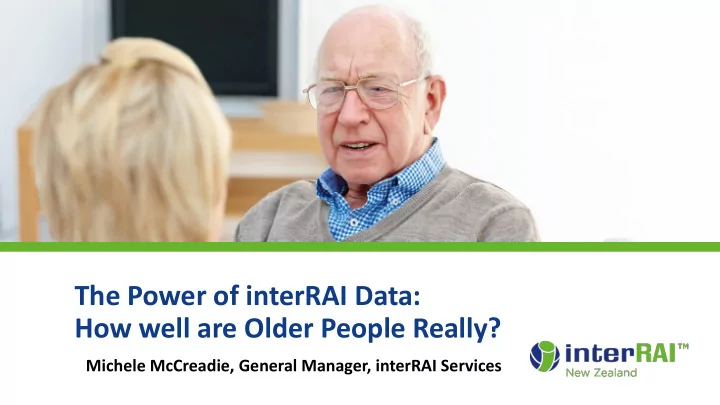

The Power of interRAI Data: How well are Older People Really? Michele McCreadie, General Manager, interRAI Services
What is interRAI I nternational Best practice Comprehensive R esident approach to clinical assessment A ssessment assessing people’s tools I nstrument needs Standardised and Common language, designed for common measures, www.interRAI.co.nz specific groups common concepts 2
interRAI in New Zealand Health of Older People Strategy interRAI Home Care instrument interRAI Long Term Care Facilities (LTCF) instrument Best Practice Guidelines Mandatory for all aged Assessment Processes for residential care providers Older People from 2015 Pilot in 5 Independent DHBs review I 2003 I 2004-2007 I 2007 I 2011 2002 I 2012 I 2015 I 2017
How it works Same assessment across New Zealand Assessments follow the person 10% of over 65s in New Zealand Information publically available Evidence based decisions 4
Collect once – use many times General information Quality Services standards Research data Metadata repository Policy standards Legal Technical standards aspects 5
What does the assessment look like The assessor takes the person and their carer through the questions as a conversation The software processes the information to create Outcomes a picture of the individual persons needs. CAPs where services could improve function, slow rate of decline or help symptoms. 6
What does interRAI tell us about the wellbeing of older people 7
Depression Rating Scale • Used as a clinical screen for depression • Range from 0 to 14 • Higher score = worse symptoms • Scores 3 or more suggest symptoms of the person suffering from some degree of depressive disorder 8
Depression Rating Scale by DHB 9
Social relationship CAP • Decreases in a person’s social relationships may affect psychological wellbeing • Impact on mood, behaviour, and physical activity • Identifies factors associated with reduced social relationships • Addresses interventions to facilitate social engagement • Only triggered at level 1 to facilitate improvement 10
Triggered Social relationship CAP by DHB 11
Abusive relationship Indicators of abuse CAP • fearful of family member, caregiver, close acquaintance • unusually poor hygiene, unkempt • Identifies potential appearance abuse/neglect situations • neglected, abused and mistreated • Triggered medium risk = one ‘Stressors’ or more ‘abuse indicators’ • Triggered high risk = one or • Depression • Poor nutrition more ‘abuse indicators’ + two • Anger or conflict or more ‘stressors’ • Health issues • Unmet needs in the current care setting • Carer stress • Social isolation 12
Triggered Abusive relationship CAP by DHB 13
Informal Support CAP • Identifies people whose informal support system may be at higher risk of not fully responding to their unfolding needs • CAP triggered when the person is: • not independent with meals/housework/shopping/transport • alone for long periods or lives alone and • no primary informal helper present. 14
Triggered Informal Support CAP by DHB 15
Loneliness • Identifies people who People over 65 years old report feeling lonely who report feeling lonely are 31% more likely to • Loneliness is a major enter aged residential predictor of entering care Aged Residential Care (Jamieson et al, 2017) (ARC) 16
Loneliness by DHB • People had interRAI assessment reported feeling lonely • Loneliness is a big predictor of entering Aged Residential Care (ARC) • 31% more likely to enter ARC for those aged 65+ (Jameison et al, 2017) 17
Enduring Power of Attorney (EPOA) • Legal authority to act on behalf of a person in matters relating to: • property • personal care and welfare when they are not able to make decisions for themselves, or to communicate those decisions • Identifies whether a person has an EPOA in place. 18
EPOA in place by DHB 19
Where next 20
Where next New interRAI assessments More interactive data visualisation Link to other data - more insight Quality indicators for services 21
Data!! Data!! Data!! He cried impatiently I can’t make bricks without clay Sir Arthur Conan Doyle – Sherlock Holmes 22
www.interrai.co.nz 23
Recommend
More recommend